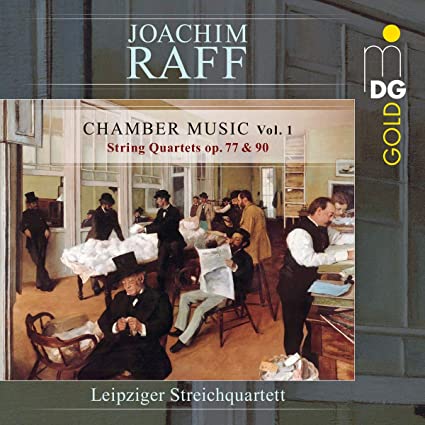

String Quartet No. 1 in D minor, Op. 77 String Quartet No. 2 in A major, Op. 90
For a composer who was primarily self-taught and received his early musical training from his father, this is exceptionally well written chamber music. As Stephen Habington points out in his review of the Symphonies of Joachim Raff (1822-1882), this composer's music stands at the juncture between Schumann and Brahms. And even though a few formative years of his life were spent orchestrating some piano works by Franz Liszt as that composer's secretary, his own compositional style is devoid of any narcissistically inclined romantic ideals and is rather firmly rooted in classical form and structure.
You can't hide flaws or deficits within string quartet writing. With only four parts at your disposal, you have to control the harmonic deployment at all times to avoid duplication of parts, and make the music challenging enough for the players without making it too opaque for the listener. And since you don't have a panoply of orchestral instruments at your disposal to alter the colouration of the sound, each of the four instruments needs to add textural integrity to the overall sound. And Joachim Raff brings all of these qualities to the fore within the first pages of his String Quartet No. 1 in D minor, Op. 77 from 1855. It was so well received that it was performed on concert stages as far away as the United States. There's a restless forward momentum to the music that is always focused on the motivic and melodic development at all times. Even the slow movements of both quartets display a flowing, variable character.
Raff's is string quartet writing at its best in the sense that it's not music written for four instruments, but rather music to be played by four instruments. This may sound like one and the same thing but it's actually worlds apart in meaning and consequence. It shouldn't feel like there are four individuals working hard to keep the music together but instead that the four parts merge into one to capture and project the big picture. And the Leipzig String Quartet which has produced more than a hundred recordings over their 30 year career, once again shape and mould their sound to suit the music at hand first and foremost. Recordings of this neglected composer's eight string quartets are almost non-existent. This new cycle by the Leipzig String Quartet should fill that gap nicely and then some.
Jean-Yves Duperron - December 2020